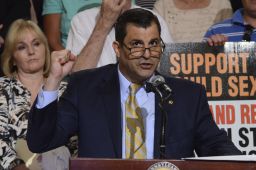After a grand jury report detailed allegations of sex abuse by Catholic priests in Pennsylvania, state lawmakers are poised to vote on whether to eliminate the criminal statute of limitations – as well as lengthen windows for lawsuits.
But what that would mean for victims who’ve already missed their windows – including many of the victims mentioned in the report – depends on several factors.
Pennsylvania law currently allows child victims of sexual crimes to pursue criminal charges against their abusers until age 50, and they can file civil lawsuits until age 30.
A bill before the state House would eliminate the time limit for prosecutions and move the lawsuit ceiling to age 50.A state lawmaker who survived abuse also wants to give temporary leeway to victims whose window to sue already has shut.
Similar bills have languished in the legislature in recent years, but House Majority Leader Dave Reed, a Republican, said Tuesday that he expects to schedule this one for a vote this fall.
“The actions revealed through the grand jury report are heinous and shameful,” Reed said in a statement on his website. “With the timeliness of this report and its findings, the statute of limitations bill … is primed for discussion in the House.”
The bill, SB 261, has rested in the House since last year, when the Senate passed it unanimously.
Grand jury: Lift prosecution limits
In Tuesday’s report, the grand jury said internal documents from six Catholic dioceses in Pennsylvania showed that more than 300 “predator priests” were credibly accused of sexually abusing more than 1,000 child victims since 1947.
The grand jury recommended eliminating the statute of limitations for prosecutions, noting that “no piece of legislation can predict the point at which a victim of child sex abuse will find the strength to come forward.”
But people for whom a statute of limitations has expired before any new law extends the window are generally stuck – especially for prosecutions.
US Supreme Court precedent prohibits extending criminal liabilityafter a case’s statute limit expires, said Marci Hamilton, a University of Pennsylvania professor and CEO of Child USA, a think tank focused on ending child abuse and neglect.
So, even if the Pennsylvania bill passed, a child victim age 51 or older when it became law would not be able to seek criminal charges.
Complicating matters is that the current limits are relatively recent. Pennsylvania’s limits for child sex abuse cases used to be five years for prosecution and two years for civil suits.
They increased in the 1990s, then again the 2000s, eventually settling to the current ages of 50 and 30.
Even those parameters prevent many of the hundreds of victims detailed in Tuesday’s grand jury report, which dates to the 1940s, from suing, the grand jury wrote.
Lawmaker who survived abuse: Lift civil limits retroactively
Enter Pennsylvania state Rep. Mark Rozzi, who has publicly shared his account of being abused by a priest when he was an eighth-grader.

Rozzi, a Democrat, wants to amend the Senate bill to provide a two-year window – starting whenever the law takes effect – during which any victim of child sex abuse could sue their abuser, no matter how long ago the crime happened.
A retroactive window for civil lawsuits “is the only avenue for these victims who are in the grand jury report” to get justice, Rozzi told CNN on Wednesday.
Rozzi’s personal story put him at the fore of a push for a similar bill two years ago.
Speaking on the House floor in 2016, Rozzi gave an emotional account of his rape by a priest in a rectory shower in Pennsylvania in the 1980s, when he was 13.
Tuesday’s grand jury report alleges that priest, the Rev. Edward Graff, “raped scores of children” in about 45 years of ministry. Graff died in a Texas jail in November 2002 while awaiting trial on suspicion of sexually abusing a boy, the report says.
The Republican-controlled Pennsylvania House passed the statute of limitations reform measure after Rozzi spoke that day in 2016, but it was defeated in the Senate.
Rozzi, who was first elected in 2012, first spoke out about his story in 2009, after a second childhood friend of his killed himself. Both friends had also been abused by Graff, Rozzi says.
He believes he has support in the House for his measure this year. Both chambers are controlled by Republicans.
“Expect that sometime in September, we will move a bill out of the House that has a retroactive window” for civil lawsuits, he said.
Grand jury also recommends retroactive civil window
In Tuesday’s report, the grand jury also recommended a two-year civil lawsuit window to allow child victims whose statutes of limitations have expired to sue – the kind of measure Rozzi proposes.
A spokeswoman for the state’s Catholic dioceses declined to comment Wednesday on SB261 and Rozzi’s planned amendment.
The “time to discuss legislation will come later,” Amy Hill told CNN, adding that the Pennsylvania Catholic Conference – the dioceses’ public affairs arm – was devastated and outraged by the revelations of sexual abuse committed in the church.
“Our focus now is on improving ways that survivors and their families can recover as they continue through a difficult healing process,” Hill said.
Abuse victim: Bill could bring justice
Shaun Dougherty, a New York restaurateur who says hischildhood sex abuse by a priest in Pennsylvania was detailed in a 2016 grand jury report on the Altoona-Johnstown diocese, told CNN’s “New Day” the bill in the House “could bring justice.”
“The retroactive (civil lawsuit) window portion of the bill … would give somebody like me an opportunity, who timed out at 15 years old,” Dougherty said Wednesday.
CNN’s Carolyn Sung contributed to this report.








